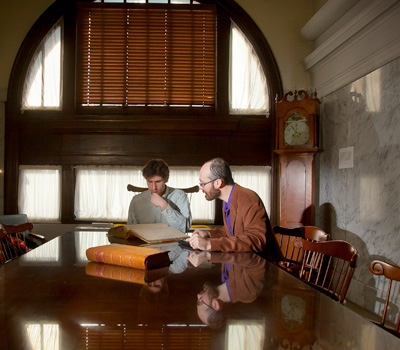Featuring Professor Christopher Phillips, English

Professor Christopher Phillips and research assistant Gavin Jones ’14.
Source: news.lafayette.edu
“One of the big reasons why I like teaching at Lafayette is that I get to know students enough that I feel like I am teaching people and am not just processing floating minds. Being at a place where small classes are encouraged, students are encouraged to reach out to faculty and vice versa, that’s been one of my favorite things about being here.”
Professor Phillips is an Associate Professor and Assistant Department Head in the Department of English. As an early Americanist, he teaches courses on the topics of spiritual writing, the legacy of the Civil War, and the literature of the sea. He will also teach a new course next semester on nature writing. Dr. Phillips employs a number of pedagogical strategies to support student learning and engagement in his classes.
He describes one unique approach used in his course on spiritual writing:
We start every single class with a minute of silence, and the students are really nervous about it the first week, and by the time we get up to midterms, a number of them will start saying that, ‘This is my favorite part of the week when I can go to a class and I can just be quiet with my classmates for a minute and not have to do anything.’ They really find that a restful space. One of the things I noticed is that the students get more comfortable with silence during discussions when we do that. It’s not uncommon for students to sit there for a minute and a half to two minutes and pretty much nine times out of ten the next thing somebody says will be amazing and inspire others to share those thoughts and bring out their own issues.
With regards to his First Year Seminar course, Dr. Phillips discusses the process of peer review:
One of the things that is really starting to come to the surface this semester in particular is that conversation makes a huge difference in peer review. Even if what you are asking them [the students] to do is written, building conversation into the process makes a huge difference- asking students their feedback on how they would like to carryout peer review and have a conversation with the person peer-reviewed, and discussing practical steps for an excellent peer review.
A large modification Dr. Phillips made within some of his courses, is having student grades solely dependent on self-assessments. He integrated this approach after tenure and conversations with his department head. Professor Phillips ultimately determines grades during individual meetings with students. In his 300-level course, he observed that final grades based on student assessment followed the same distribution pattern as if he was the assigner. He describes the advantages:
One of the benefits is that I have never had my teaching tied to course goals as closely as I did while doing that because those were the only day-to-day standards that we had to go with. We didn’t have A’s and B’s to go with to hold up and say, “OK, this is an A and this is a B”; it was much more, “OK we’re trying to get this particular type of learning done. Now, let’s think about how we are going to get to that kind of learning.” [T]he students really responded well to that, and many said that they had never paid attention to the course goals on a syllabus before and had never known why they were there. They also said it made the course feel so much more coherent and much more organized because they got why we were doing things.